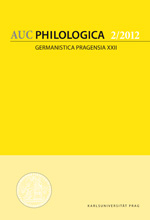Reflexion kontra Wollen: Figuren der Lebensskeptiker in den Romanen Wolfgang Koeppens unter dem Gesichtspunkt der pessimistischen Philosophie Arthur S
Reflection versus Will: The Figures of Life Sceptics in Wolfgang Koeppen’s Novels Considering the Pessimistic Philosophy of Arthur Schopenhauer
Author(s): Marie FrolíkováSubject(s): Language and Literature Studies
Published by: Univerzita Karlova v Praze, Nakladatelství Karolinum
Summary/Abstract: The purpose of this study is to prove that there are certain levels in Wolfgang Koeppen’s novels which place Koeppen within the Schopenhauerian tradition of thought. The question is in what sense we can be speaking of Koeppen as a pessimist. An interpretation the aim of which is to point to the links between the reflections presented in Koeppen’s novels and Schopenhauer’s philosophical work demands careful attention to details and subtle discriminations while scrutinizing Koeppen’s texts, and even the extensive knowledge of Schopenhauer’s treatises. There are, in fact, essential philosophical moments in Koeppen’s novels which correspond to Schopenhauer’s ideas, especially as far as the basic characteristics of human life and the process of history are concerned. To demonstrate his existential disillusionment Koeppen always introduces an artist or an intellectual as a main character, who derives a pessimistic image of human existence and the orientation of occidental culture from the ravages of the daily practical life and the destructive course of the history. So understood, Koeppen’s novels can be read from the metaphysical point of view. They not only depict the specific problems and phenomena of the time of their origin but also such aspects of human existence which can be identified as timeless. Koeppen shows people acting at the instigation of their desires and he recognizes the constant instinctive motives of many social and political actions. In Koeppen’s belief that social processes are partly the manifestation of blind nature power becomes the analogy between his view-points and Schopenhauer’s view-points most evident. This may partly explain why the main characters of Koeppen’s postwar trilogy are so sceptical about the future development of the political and social situation in Germany despite the fact that the democratization process is becoming effective there. Koeppen focuses on those human individuals who look at the social and historical turbulences in disbelief and from a contemplative distance, which enables him to reveal the eternal truth of the moral dubiousness of human essence. Nevertheless, just the fact that Koeppen’s view of the human existence and history depends to a large extent on an acquaintance with what has gone before has a decisive influence on his evident inclination towards generalizations, which may prove to be a weak point of his depiction of the human and social reality of the postwar Germany.
Journal: Acta Universitatis Carolinae Philologica
- Issue Year: 2012
- Issue No: 2
- Page Range: 9-43
- Page Count: 35
- Language: German

